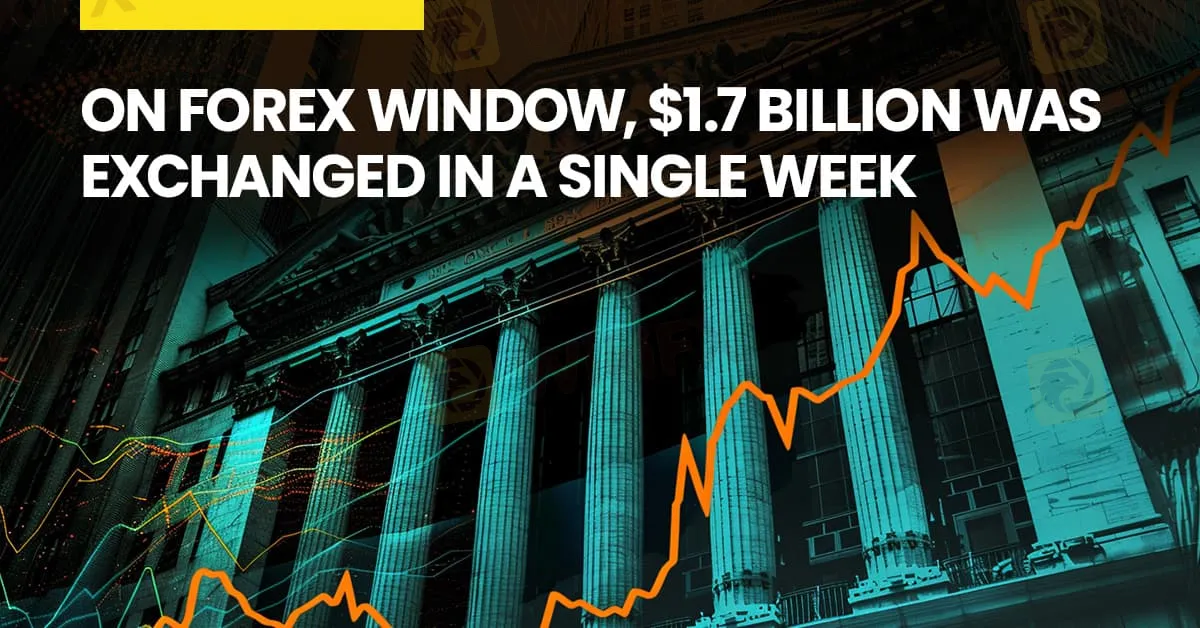简体中文
繁體中文
English
Pусский
日本語
ภาษาไทย
Tiếng Việt
Bahasa Indonesia
Español
हिन्दी
Filippiiniläinen
Français
Deutsch
Português
Türkçe
한국어
العربية
ON FOREX WINDOW, $1.7 BILLION WAS EXCHANGED IN A SINGLE WEEK
Abstract:In the past week, there has been a 276.1% increase in FX transactions at the Nigerian Autonomous Foreign Exchange Market (NAFEM) window, totaling $1.7 billion.

In the past week, there has been a 276.1% increase in FX transactions at the Nigerian Autonomous Foreign Exchange Market (NAFEM) window, totaling $1.7 billion.
The only official market trading sector available to investors, exporters, and end users is called NAFEM. Since the Central Bank of Nigeria (CBN) eliminated numerous exchange rates, dealings in FX are conducted at exchange rates that are set by the conditions of the market, resulting in effective and efficient price discovery in the Nigerian forex market.
Afrinvest West Africa reported the FX window in a report over the weekend the exchange rates for official and black markets.
The article claims that while the naira fell 2.4% against the dollar to end at N1,169.99 at the NAFEM official window, it gained 7.4% to close at N1,145 against the dollar on a weekly basis at the parallel market.
The CBN persists in its short-term efforts to fortify the national currency. Notwithstanding a week-over-week increase in currency market activity to $1.7 billion during the NAFEM window, the naira fell 2.4% against the dollar to settle at N1,169.99.
The statistics showed that at the end of the week, the naira was trading at N1,145 to the dollar on the parallel market, up 7.4% for the week.
As market volatility subsided after the central bank decided to start selling dollars to bureau de change operators, the local currency lately started to rise quickly.
Demand for forex is being driven by legitimate needs, such as Form A applications for school fees, medical expenses, Personal Travel Allowance (PTA), and Business Travel Allowance (BTA). The use of Form Q indicates that Small and Medium Enterprises (SMEs) are also struggling with the shortage. As a result of the naira's recovery, according to Bismarck Rewane, Managing Director of Financial Derivatives Company Limited, cost pressures should lessen.
According to Rewane, since February, the naira has gained considerably on all markets, driven by the cleaning up of the FX market, a rise in the supply of FX, and a decline in the demand for dollars.
The CBN's credibility and confidence have increased as a result of the $7 billion verified currency backlog. But the crucial issue still stands: Will the naira depreciate once more? If Nigeria keeps acting morally, the answer is no. With foreign portfolio investments increasing, the outlook for forex earnings is positive. Significant price increases in Nigeria's main export goods, with cocoa reaching a record high of nearly $10,000 per tonne on the international market and oil prices surpassing $85 billion after output reached an astounding 1.48 million barrels per day in February 2024, according to Rewane.
He went on to say that Naira's appreciation came about as a result of the Monetary Policy Committee (MPC) meeting that took place on February 26 and 27, when interest rates were substantially raised by 400 basis points (bps) to 22.75 percent annually.
In order to control prices, the MPC also decided to raise interest rates by 200 basis points to 24.75% annually during its meeting on March 24 and 25.
Together with the CBN's house-cleaning effort to reduce excess demand for dollars, these actions indicate that the apex bank would stick to the tried-and-true strategy of positively anchoring inflation and stabilizing exchange rates. As a result, Rewane stated, “the naira is expected to sustain appreciation, albeit slowly.”

Disclaimer:
The views in this article only represent the author's personal views, and do not constitute investment advice on this platform. This platform does not guarantee the accuracy, completeness and timeliness of the information in the article, and will not be liable for any loss caused by the use of or reliance on the information in the article.
Read more

OctaFX Flagged by Malaysian Authorities
OctaFX has been officially listed on warning lists by both Bank Negara Malaysia (BNM) and the Securities Commission Malaysia (SC). These alerts raise serious concerns about the broker’s status and whether it is legally allowed to operate in Malaysia.

TradingPRO: A Closer Look at Its Licences
In an industry where safety and transparency are essential, the regulatory status of online brokers has never been more important. For traders seeking to protect their capital, ensuring that a platform operates under recognised and stringent oversight can make all the difference. Keep reading to learn more about TradingPRO and its licenses.

Oil Price Breakout Incoming? Investors Should Stay Alert
Oil prices are hovering around a critical level, with potential yet to be fully unleashed. Investors must prepare for sudden changes.

New SEBI Regulations on Intraday Trading
The Securities and Exchange Board of India (SEBI) has implemented revised regulations on Intraday trading, with effect from November 20, 2024. These regulations are meant to lessen risks and prevent speculative trading practices.
WikiFX Broker
Latest News
How much money will you earn by investing in Vantage Broker?
IronFX vs Exness Review 2025: Comprehensive Broker Comparison
Fraudsters Are Targeting Interactive Brokers' Users with Lookalike Emails
Everything you need to know about ADSS
SkyLine Guide 2025 Malaysia: 100 Esteemed Judges Successfully Assembled
Vantage Markets Review 2025: Trusted Forex and CFD Trading Since 2009
Top Tips to Choose the Best Forex Broker in 2025
SEBI Notifies New F&O Rules for Investors - New Derivative Trading Limits & More Amendments
Interactive Brokers: Global Office Visits and Licensing Details
U.S. Jobs Data Released: A Potential Boost for Gold Prices
Currency Calculator


